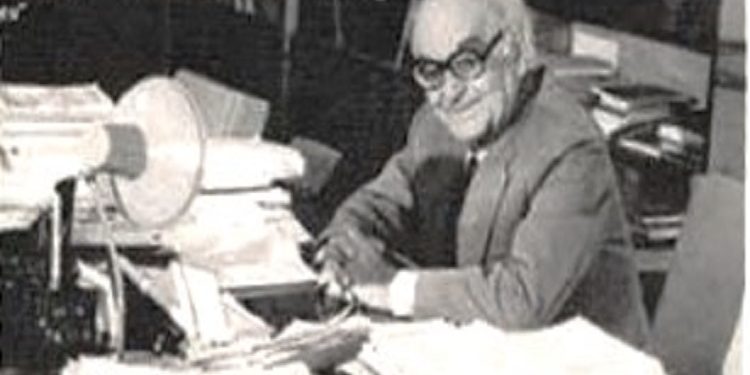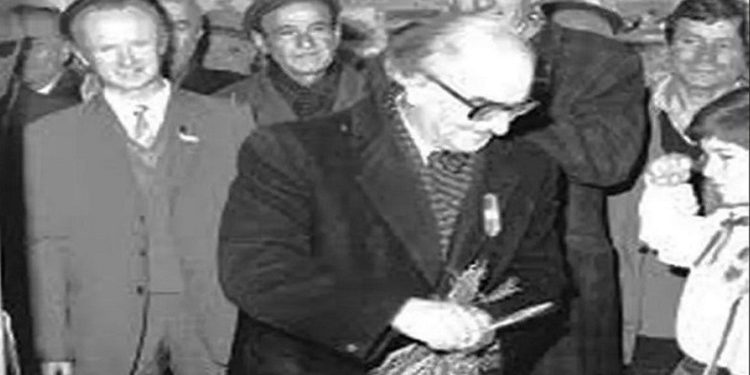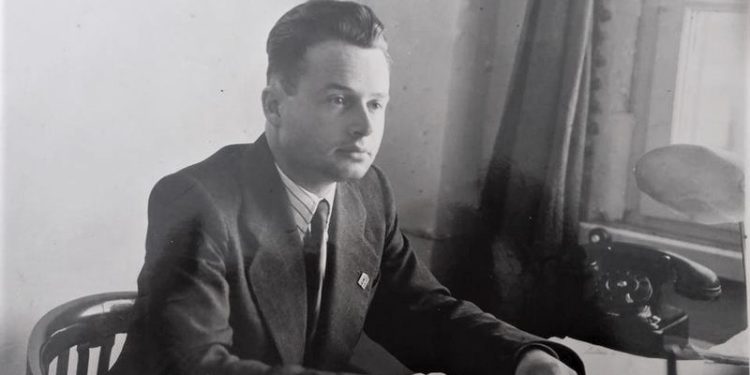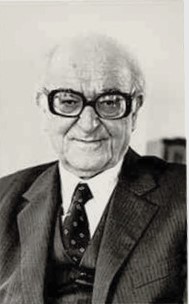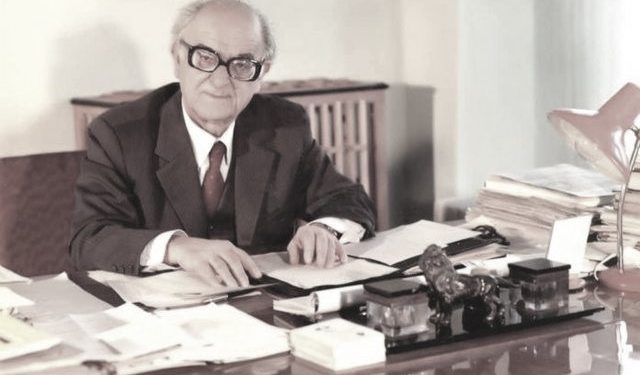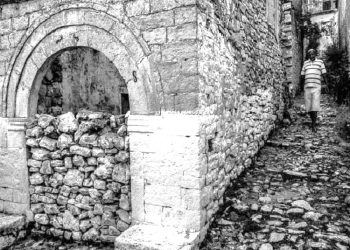By Dr. Andi Pinari
The second part
-Aleks Buda, a European scholar, in Albanian totalitarianism-
– Methodology –
Memorie.al / This short presentation will try to reflect the scientific and administrative activity, as well as the circumstances in which the personality of the professor arose and acted, will focus on issues related to the relationship of this researcher, as part of the intellectual elite in the years 1945-1954, with the Albanian totalitarian model. These years can be considered as the harshest years of Albanian totalitarianism, because they are the first years of the installation of a new political and state model, which had the class struggle as its principle and state violence as its tool. His academic activity of these years can help to understand to what extent the orientation of scientific research, came from the tradition of the National Renaissance and the period between the two wars, was imposed from above, or depended on the researcher.
Continues from last issue
The contribution of prof. Budës, was not only in the collection of historical facts and in the presentation of arguments that took place in Enver Hoxha’s speech before the Conference, but also in the drafting of other documents, in defense of the Albanian borders. Prof. Buda and his colleague Pepo participated in several open debates organized outside the Conference and disputed the Greek claims. In the notes he left, he remembered that; “the listeners paid attention to the issues we raised, which we illuminated in a new light”. Albania’s participation in the Peace Conference was successful, because it managed to confirm its ranking, alongside the anti-fascist countries.
Alex Buda as a researcher at the Institute of Sciences
The Institute of Sciences was one of the new structures that arose when the communists came to power. However, it was based on the existing experience in this direction, started in 1940, with the creation of the Institute of Albanian Studies, where well-known Albanian and Italian researchers of language, literature and art were involved.
Immediately after liberation, the Institute of Studies was established (1946) and in 1948, it was reorganized as the Institute of Sciences and became the center of research and organized scientific activities. In addition to the employees from the pre-war institute who, in fact, began to be purged little by little, many new employees were included and their number increased; the first director of this institute was Selahudin Toto. The institute consisted of 3 sections:
a) Linguistics and literature;
b) Of history and sociology;
c) Of natural and biological sciences.
In the government’s decision of January 1947, the purpose of creating this institution is clearly stated, which would contribute a lot to the study and solution of current problems that are closely related to the economic, social and cultural development of the country. This institution would be placed under the direct responsibility of the Council of Ministers and an important representative of the government was placed at the head of the institution. This task was initially held by Dr. Manol Konomi. Prof. Buda was appointed head of the section of history, sociology and economic sciences. In 1947, the Institute had 23 members, among which only two of them had been part of it before, Aleksandër Xhuvani and Eqrem Çabej.
The formative years of the communist regime were characterized by mass mobilization and repression on a significant scale. It was a period when violence was used to reshape social relations. Such a large-scale operation, however, could not be carried out by repressive bodies alone, but relied on the acquiescence or active cooperation of those who benefited from – or hoped to benefit from – the new order. This was also a period when opportunities for movement into the higher ranks of society, becoming part of the new state administration, opened up for many workers, peasants and activists.
The behavior of the Albanian totalitarian model, in relation to the people of science during the years 1945-1954, is only one of the many elements of the new relations, which are created between the state and the individual after 1945. The efforts for total control of the public and private activity of researchers, have also characterized the Albanian model, creating different profiles, which can be grouped into these main divisions:
First, the intellectuals who openly opposed him were those who, with their attitudes, reacted to the totalitarian model, and for that they were harshly condemned or ostracized.
Second, there were the intellectuals who remained silent, keeping their distance from politics and choosing to focus on academic life.
Thirdly, there were the intellectuals who were formed later and put themselves in the service of power, being quite active. This third group is likely not yet active in the first years of the institute’s operation.
As everywhere in totalitarian countries, we can say that the totalitarian state had a double relationship with researchers. On the one hand, they were kept under control and subjects were dictated to them that coincided with the interests of the government, while on the other hand, they had the privilege of being seen with admiration by the government, as intellectuals with values and indisputable authority in the public.
These relations between the state and the researchers were developed in a rather charged atmosphere, where the punishments against opposing intellectuals were quite harsh, because they were considered the most dangerous and political opponents of the communists.
The Trial of the Deputies and the conviction of Selahudin Toto, the director of the Institute of Sciences, in 1945, but also many other convictions, openly showed the nature of the new political system and the behavior towards opposing intellectuals. After eliminating those it saw as opponents, the totalitarian state needed to have a group of renowned scholars, who were educated abroad, who would work to elevate the national culture.
This was also the connecting point between those researchers who, although they supported the war, could not agree with the harsh repressive measures of the new regime. The academic interest of this second group of researchers and the inability to react made them remain neutral and maintain throughout the period, the profile of the researcher not involved in active politics. Even prof. Buddha, belongs to this profile. In relation to this attitude, the opinions of other historians who have evaluated, apart from the academic activity, this almost neutral political attitude also come to our aid.
Professor Kristo Frashëri, as he appreciates the great work of prof. Budës, in laying the foundations and raising the Albanian historiography to scientific levels, emphasizes that he; he chose the middle path dictated by the country’s need, for cultural work and the renaissance education he had received in the family. He decided to continue working in the field of culture, staying as far as possible from ideological topics, a space he found in the history of the distant past, from the Illyrians, to Skenderbeu and the National Renaissance.
Professor Paskal Milo thinks that prof. Buddha stayed away from political engagement, because of his Western education, his conviction that science and history were his fields of action and the pleasure of life. Prof. Buddha has served Albania, history, science and Albanian culture. If at certain moments, these precious services coincided with the interests of the communist regime, or were exploited by it, there is no blame or responsibility for the great historian, or other great writers, scientists and artists.
While professor Pëllumb Xhufi thinks that prof. Buda used the good relations he had with the regime to influence the promotion of Albanian sciences, starting with the training of specialists in Latin, ancient Greek and Ottoman, both inside and outside the country. The Institute of Sciences became a shield; perhaps the only place where representatives of what were considered the “inverted classes” could be employed or involved in scientific projects.
In these years, the main work done by the sociology sector was organized in the direction of archaeological research, linguistic research focused on Illyrian ethnogenesis, the Middle Ages, the Renaissance, i.e. a work spread over a rather wide time frame. It must be said that the level of scientific research in history increased, despite the ideologisation suffered by all sciences, but above all history. Despite this, prof. The Buddha managed to study subjects covering all historical periods with a high degree of professionalism.
His favorite topic in those years was the history of Skenderbeu, which was also the first scientific paper as a historian of prof. Buddha. This paper was presented at the first conference about Skenderbeu, held on January 17, 1949, on the occasion of the 481st anniversary of the hero’s death, in the theater hall, and the material was published three days later in the press. Since the new regime was based on hatred towards the beylers, those who were historical figures with this background were viewed with suspicion, where even the national hero, who was part of the feudal aristocracy and held the title “bey”, could not escape.
This dogmatic attitude harmed the national history and prof. Buda, in his presentation, laid the foundations for dealing with the history of the national hero, dealing with him in the context of the time he lived and his extraordinary contribution to the unification of Albanians in the fight against the Ottomans. This would be the baseline that would free the national hero from class prejudice.
In September 1952, a conference was held by the Institute of Sciences that had two main themes. The first topic was the formation of the Albanian nation, while the second topic was the beginnings of the Albanian national movement. The organizer of the conference was prof. Buda, who had managed to place in the great hall of the National Library, where the conference was held, a quote from Stalin, which said: “No science can develop and progress without a struggle of ideas and without critical freedom”. The established slogan seemed to be a message for researchers to discuss freely at the conference, but also for vigilant party members not to oppose Stalin’s statement.
Another issue discussed was the model of Albania’s history, the first discussion of which took place in February 1952. In this meeting, prof. Buddha lays down one of the important methodological principles of history writing. He first insists that files be created in chronological order, which, when completed, constitutes the skeleton of the work. But it also requires the creation of a second file, which must be arranged by problems, because there are materials that cannot be arranged chronologically, because they summarize large phases.
This is how the rather broad and accurate perception of history emerges, as a science that requires not only chronological treatment, but also problematic treatment and above all, in close cooperation with other auxiliary sciences. Regarding the issue of the model of the history of Albania, the State Security also had information. Here is what is said in a report by the collaborator “Dhelpëria”, about the Buddha: Report of B.p. “Fox”, received by P.Operativ R. Zavalani, Tirana, on 24.12.1953.
“In the History section: Alex Buda is the head of the section. He tries to learn Marxism-Leninism, he knows enough about the issues of History, but there is confusion in his head. The main work of the Section is the History of Albania, which is being prepared. From what we talked with Alex Buda, the different monographs were not made on the basis of a common model, nor were the theses of each monograph discussed beforehand (as is the case in the Soviet Union), but each one acted according to his own mind. . In addition, the level of each monograph is not high, some are weak. So we have the impression that the History of Albania will not be all one level and with gaps”.
Many of the researchers of the time were also members of the People’s Assembly. In two legislatures, from 1950-1954 and 1954-1958, also prof. Buda, was a member of the People’s Assembly. He was not the only one from the Institute of Sciences who became an MP. Especially in the district of Elbasan, some of the most important names of culture and knowledge stand out, such as; Aleksandër Xhuvani, Kole Paparisto, Petraq Popa, Dhimitër Shuteriqi. However, the position of the deputy and of the People’s Assembly itself was irrelevant, because the elections were formal and the real power was negligible.
In his biography, which is in the funds of the Assembly in the ACA, it appears that he was included in the list of deputies, as a tireless worker in the field of culture. It says: “With full right, the people of constituency no. 43, of the district of Elbasan, has proposed for the People’s Assembly, the candidacy of this patriotic intellectual, who has put his energies at the service of the development and progress of our national culture”.
He also contributed to the great feature film about the national hero Skënderbeu and for the work he did, he was decorated with the first class Order of Work. He was also decorated with the Order of Labour, third class. Meanwhile, there is also a series of other elements, which show the great difficulties that were created for him and his family, during this first phase of establishing the totalitarian model. By the time he was leaving for the Peace Conference, in 1946, his two brothers-in-law had been arrested and were in prison.
In the letter that prof. Buda sends his friend Vasilika, before leaving for Paris, tells her that he had been in prison and had met the two brothers-in-law, who were fine, but were afraid of any transfer to Burrel prison. In 1948, his brother, Stas, was arrested because, as the heir to their father’s pharmacy, he had failed to pay the outstanding tax.
The imposed tax was illogical because it did not match the pharmacy’s income. As prof. Buddha, there he would understand how strong the hand of the dictatorship of the proletariat was. After he was sent to work in the Maliqi swamp and the authorities were convinced that he could not pay, Stas Buda was released after a year and a half in prison.
All these facts point to an ambivalent position between science, political commitment and family problems, dictated by the new regime. However, prof. Buddha managed to focus more and more on the issues of science, finding his space of inner freedom in that difficult time.
CONCLUSIONS
Prof. Buda was, above all, an erudite of European proportions, which devoted his life to studies and writings on Albanianology. Raised in a patriotic family, in a very active city, he was protected by patriotism. Lived and studied abroad for 18 years. Especially during the years of studies in Austria, he was oriented towards philological and historical studies, knowing well Latin and ancient Greek.
During the years of higher studies, he made company with many other intellectuals, patriots with left tendencies and began to have left political tendencies and to sympathize with Marxism, still not knowing the true face of applying the ideology in practice. However, it felt much more social-democratic, with respect for humanism and parliamentary democracy. Returning to the homeland, it
can be said that it radicalized him politically, because on the one hand, the country was occupied and, on the other hand, he and his family suffered under the occupation regime.
He was imprisoned twice and forcibly sent to join the army in Italy, although he was a professor. In addition, his mother was also briefly imprisoned as a result of his brother’s involvement in the anti-fascist resistance. Like the majority of Albanian intellectuals, he could not agree with the occupation of the country and therefore quite spontaneously, he became part of the Anti-Fascist Movement.
His stature as a prominent intellectual and with left-wing convictions led him to be approached by the new government, being appointed to important positions, as vice-president of the National Liberation Council of Elbasan, as director of the National Library, as a member of the Albanian delegation in the Paris Peace Conference, as a member and head of the section of sociology, history and economics, at the Institute of Sciences and then as a deputy of the People’s Assembly.
He achieved and accepted all these positions, because deep down, he was a man of knowledge and would try to give his best, to illuminate and elevate Albanian history. Above all, he laid the foundations of Albanian historiography. Meanwhile, he lived in a system where his brother was imprisoned for a while because they could not pay the extraordinary tax imposed after the war. His brothers-in-law were also imprisoned. Freedom of expression was limited and many intellectuals were imprisoned and killed.
He knew well the consequences if he rebelled, although he silently disagreed with the class struggle, the lack of freedoms, the political persecutions and the drastic restrictions on human, scientific and cultural contacts with the outside world. This can be seen in the efforts he made for the inclusion in the institute of those who, although they had blemishes in their biographies, were involved in scientific projects. Due to his skills as a researcher, he gradually became the most prominent representative of scientific research in Albania, perhaps among the only ones who kept in contact and met with foreign colleagues in various international activities. Memorie.al




